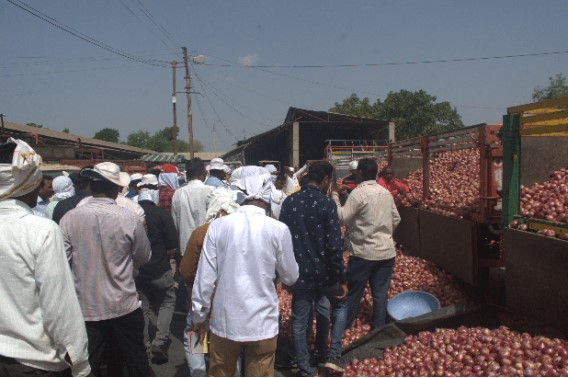Onions are a vital crop for Indian farmers and consumers, but the government’s frequent changes in trading rules for onions have created instability in the market. This is due to the Essential Commodities Act (ECA) and the Foreign Trade (Development Regulation) Act (FTDR) which give the government broad power to limit warehousing capacity and regulate the trade of commodities. As a result, investments in onion warehousing are poor, and up to 40% of the stock is lost due to poor storage conditions, hurting farmers and others in the supply chain. These regulations also enable the government to ban the trade of onions and other commodities with no justification or legal recourse, particularly when prices of onions rise. The following case studies of onion farmers in the Nashik region of Maharashtra demonstrate these challenges.
Lasalgaon
Lasalgaon, a small town in the Nashik district of Western Maharashtra, was once known as the Onion capital of Asia. The town has an Agricultural Produce Market Committee(APMC) dedicated solely to onion trade. However, recent export bans and market fluctuations caused distress among onion farmers and traders in Lasalgaon. Farmer Mukund Dnyaneshwar Holkar and trader Om Chauthani shared their experiences of the erratic nature of the export bans and lack of clear communication from the government. These sudden and unannounced bans led to losses for traders and farmers who were not able to export their produce. The situation in Lasalgaon caused a general sense of uncertainty and dwindling spirit in the once thriving onion market. The solution to this problem would be a transparent policy framework that protects farmers from future obstacles and provides clear guidelines on export regulations.
Satana
Satana is a small town located 90 km northeast of Nashik city known for its busy APMC, which provides a marketplace for farmers in the area to sell their harvest. The Satana APMC Secretary, Mr. Tambe explained the process of trading at the APMC. This process involves auctioning of the produce, where the highest bid wins, and a trade receipt, called the Sauda Patti, is provided to the farmer. The produce is then inspected and weighed by an APMC-appointed weigher. The weight and rate are mentioned in the Kaata Patti, which is used to calculate the total fee, after deducting the trader’s costs and labour, and the farmer is paid in cash.
Mr. Wagh, a farmer from the region, discussed what it was like to experience a slow market first-hand. The rising costs for onion cultivation were one of his top concerns. He said that labour costs had risen this year, and since onion is a labour-intensive crop, it has a significant impact on onion production costs. Mr. Wagh said that transport expenses have also increased because of fuel costs. He feels lucky to live 5 km away from the APMC and is empathetic towards farmers from villages as far as 25 km. These increased costs have further reduced his profits this year. A year ago, Mr. Wagh had sold his yield for around INR 1300-1400 per quintal. This year the rate has been INR 700- 800 per quintal.
Satana plays an important role in the onion trade as it offers a localised marketplace for the farmers of the onion-growing belt and ensures the transaction. However, prices in Satana are lower compared to other markets.
Pimpalgaon Baswant
Pimpalgaon Baswant is a town located 30 km from Nashik, and unlike Lasalgaon and Satana, the farmers here are optimistic. The Pimpalgaon Baswant APMC is housed in a grand facility of 100 acres, complete with amenities like farmers’ lodges, merchant’s complex, water storage ponds, wastewater treatment plants, and sheds for afternoon onion auctions. Mr. Deepak Gawli, the head of the Onion and Tomato market at the Pimpalgaon Baswant APMC, explained that the market separated from the Lasalgaon APMC in 1995 and had grown significantly since then.
Farmers travel from many surrounding villages to sell their produce at Pimpalgaon APMC, as it offers better facilities and connectivity compared to other markets like Satana. Even though Pimpalgaon area is not ideal for onion cultivation, its location and good infrastructure attract farmers for trading. The success of Pimpalgaon Baswant could be a valuable example for other agricultural markets across India.
Conclusion
Ad hoc trade policy decisions have created market uncertainty and reduced the incomes of onion farmers across the country. Adopting a stable export policy approach would be beneficial to the farmers. You can learn more about these case studies in detail here.
Read more: The affordability of free electricity
Post Disclaimer
The opinions expressed in this essay are those of the authors. They do not purport to reflect the opinions or views of CCS.






